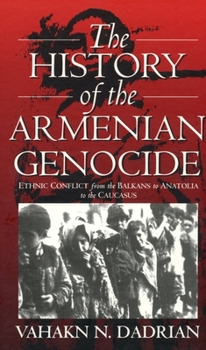The History of the Armenian Genocide: Ethnic Conflict from the Balkans to Anatolia to the Caucasus
Select Format
Select Condition 
Book Overview
The Armenian Genocide, though not given such prominent treatment as the Jewish Holocaust which it precedes, still haunts the Western world and has assumed a new significance in the light of "ethnic cleansing" in Bosnia and, more recently, Darfur. This study by the most distinguished scholar of the Armenian tragedy offers an authoritative analysis by presenting it as a case study of genocide and by seeing it as an historical process in which a domestic conflict escalated and was finally consumed by global war.
Format:Paperback
Language:English
ISBN:1571816666
ISBN13:9781571816665
Release Date:December 2003
Publisher:Berghahn Books
Length:480 Pages
Weight:1.30 lbs.
Dimensions:1.0" x 5.5" x 8.5"
Customer Reviews
5 ratings
Amazing book.
Published by Thriftbooks.com User , 18 years ago
I had heard a lot about this book and I just finished reading it, I am quite familiar with the subject matter but in my oppinion this is the best. I think this book is a great contribution to the historical understanding of the Armenian Genocide and of Genocide in general. It's an extremely well researched book. The authors wide reading in the relevant sources in Turkish, Armenian, German, French and English, has no parrallel. I highly reccommend this book to anyone interested in this subject.
Excellent Scholarship
Published by Thriftbooks.com User , 21 years ago
This study took an interesting approach, despite its title it has little about the actual implementation and excecution of the Armenian genocide instead covering topics such as: the Abdul Hamit Massacres, the Adana massacres, the bank Ottoman raid, Islam's bent for domination which implies inferiority for non-muslims dhimmis such as Armenians, German complicity, the failure of European humanitarian intervention due to their vested and colonial interests, the Young Turks, how the precarious situation of Armenians constantly massacred and vulnerable with little weaponry or outside diplomatic assistance made them contrary to Balkan Christians take the route of asking for reforms and protection within the Ottoman Empire instead of seeking their independence as they were in an existential crisis where they decided upon the failed project of seeking protection from a Turkish system that thrived on repression and oppression, the Kemalist invasion of Russian Armenia, a comparison of the Holocaust and the Armenian genocide, the Turkish post-war tribunals that failed to punish the key players of the Armenian genocide(but these trials did provide proof of the intent to destroy the Armenians), the role of impunity during and after the genocide and earlier massacres in the failure to punish muslims for their crimes and how the implacable Kemalists along with European vested interests made sure there was little in the way of punishment, among other topics. Chapter 14 entitled: "The Implementation of the Genocide" only spans from page 219-235 in the edition I read(second revised edition 1997). Such an approach to this study makes ensures that it is well covered why the Armenian genocide occurred, which is more important than drudging page after page about the actual genocide and its implementation, which would have gotten tedious as this book is over 400 pages. The scholarship of Dadrian shines throughout the work, he cites countless works in Turkish, Armenian, German, French and English and the work is very well referenced with a plethora of footnotes. This man has been studying the Armenian genocide for decades and it shows, I doubt much is written in the languages he can read about the subject that he has not already read, and most of it seems cited in this work. How Turkish historians and other historians can deny the Armenian genocide shows to anyone who has read this work their complete lack of honor and decency, to comment on history with no other desire than to extricate Turkish society and state from their mis-actions. Dadrian uses Austrian and German diplomatic archives at a time when they were Ottoman Turkey's wartime allies, he references the memoirs of architects and implementators of the genocide where they incriminate themselves, he cites the Turkish trials after the war to punish the Young Turks published in the official Turkish government gazette at the time(Takvimi Vekayi), Ataturk's speeches, eyewitnesses, Allied diplomatic archives, Turkish
Very Informative
Published by Thriftbooks.com User , 22 years ago
Incredible research went into this book. Not only can one get a historic view of the Armenian Genocide, but it also demonstrates the essentials of good academic research.
well written and thoroughly researched
Published by Thriftbooks.com User , 26 years ago
This was a well written and thoroughly researched book documenting the treatment of the Armenians living under Turkish rule. Despite the scholarly nature of this work, it is not a dry academic tome. I highly recommend this book for those who seek to gain insight into this episode of genocide which, in many ways, may have inspired Hiltler's later genocide of the Jewish people.
Excellent
Published by Thriftbooks.com User , 26 years ago
An excellen treatment of the topic. I recommend it to everyone who wants to learn about the history of turks.





